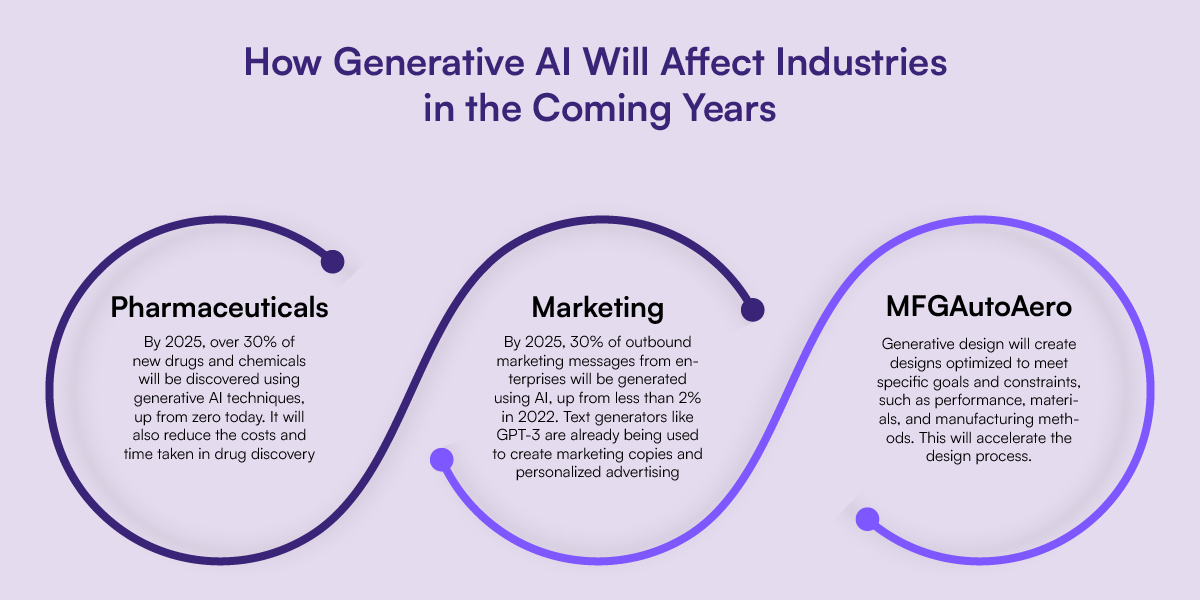Table of content
In today’s tech-driven era, enterprise leaders find themselves at a crossroads where they have to deal with high-interest rates, inflation, and geopolitical concerns. They look for ways to accelerate product development and enhance service quality. One such ‘way’ is through a technological revelation you have already heard of - Generative AI.
Generative AI isn’t just the most buzz-worthy tech trend of 2023. Between 50% to 60% of all organizations have already adopted the disruptive technology.
Whether you consider customer relationship management (CRM), enterprise resource planning (ERP), product engineering, or service delivery, the applications of generative AI for enterprises just keep growing.
Generative AI Enterprise Use Cases
Generative AI is a subset of AI that goes beyond data analysis to create new and unique content. Based on patterns learned from the data they are trained with, generative AI tools like ChatGPT, DALL-E, and StyleGAN have demonstrated groundbreaking results.
In general, the enterprise use cases for generative AI revolve around automating, simplifying, and enhancing the quality of operational workflows.
Quick Automation of Project Workflows
When it comes to workflow automation, generative AI helps enterprises, especially marketing and sales-driven organizations with content creation. With automated content generation, businesses can speed up their entire digital marketing workflow. Generative AI can create a variety of engaging blog posts and ad copies, as well as personalized social media posts and product descriptions to target the right audience.
Simplify Repetitive Tasks for Employees
Regardless of the industry you pick, there are always going to be repetitive tasks that become a hurdle for innovation in enterprises. In this scenario, generative AI not only streamlines repetitive tasks for employees but also provides consistent and high-quality outputs. This means you have better customer engagement and a higher number of satisfied customers across the board.
Maintain High-Volume Production Standards
As generative AI continuously learns from the data it processes, it can interpret complex data to refine production standards. Whether you are on the factory floor or in any other part of the organization, generative AI equips you with the right tools to address quality standards in production.
Looking to Enhance Your Operational Efficiency?
Get in Touch with shopdev’s AI & LLM Developers Today!
How Enterprises Are Using Generative AI Today
Although the technology itself is the same for all, not all enterprises are able to use generative AI to its full potential. In some enterprises, it may be used as part of a conventional subscription-based tool to improve operations to a certain extent. In other cases, organizations are even building their own AI models to add to their tech stack.
Industries Embracing Generative AI
Let’s look at the ways different industries are utilizing the power of generative AI:
E-commerce and Retail
To understand the use of generative AI in retail, we take the example of Shopify. The eCommerce platform has now introduced a feature called Shopify Magic, which allows retailers to generate product descriptions using generative AI.
Users can input their desired tone and keyphrases for the product-related content they want to generate. Then, Shopify’s magic tool automatically generates a description based on the given parameters. In the background, of course, its generative AI working its magic.
Shopify makes the list of a handful of retail enterprises that have adopted generative AI, and even though Shopify Magic is still in its infancy, it is being well-received.
Software Development and FinTech
Where there is online shopping, there ought to be transactions. That brings us to two of the notable industries that have a high AI adoption rate - FinTech and software development.
Stripe is a renowned financial services SaaS provider that uses OpenAI’s GPT-4 to enhance its operations.
The generative AI tool allows Stripe to improve query management, summarization, documentation, and more. An internal feature called Stripe Docs is also available for users to enter their natural language queries related to documentation.
Upon submitting their query, users receive a response where Stripe’s AI summarizes and extracts important information in a human-like format. Moreover, the SaaS provider is also working with OpenAI and other generative AI companies to create smoother subscription and checkout processes for customers.
Travel and Hospitality
Here’s yet another industry that is using generative AI to improve customer experience. The travel and hospitality sector is all about ‘looking after’ the customers, and Expedia understands that.
Expedia uses the beta version of the popular generative AI tool ChatGPT for its travel planner. The AI integration allows Expedia users to ask questions and receive recommendations for travel, lodging, and other recreational activities. Not only that, but it also saves the suggested hotels and destinations using an AI-based feature. This means that customers can see what was recommended earlier and easily book their next destination.
In the context of enterprises, Expedia’s AI use case comes in handy for frequently-travelling employees. The solution streamlines the travel process and gives the employees more time for their high-priority tasks.

Generative AI Use Cases: Ethics and Compliance
Before we get into generative AI use cases, here’s a quick heads-up. With all the applications and developments in the field of generative AI, we often ignore the fact that the technology is still in its infancy. This means that there are still many unknown factors. For instance, the end-users are not aware of the way the AI models are trained, or what data is used to train them.
The fact is that generative AI models have a wide range of capabilities that can be very useful, but also very harmful when it comes to cybersecurity. Not to mention, the quickly growing skillset of generative AI models may result in them replacing skilled professionals.
Considerations for Ethical Use of Generative AI
With that said, what should enterprises do to ensure that they are ethically using generative AI? Here are a few tips to get started:
- Do not use sensitive data to train an AI model. The inputs must be depersonalized and non-sensitive
- Stay updated with current generative AI trends so that you know which tools are credible
- Set up an ethics policy for AI usage in your enterprise. It should guide internal users to use the right AI tools
- Provide training to all employees so that they stay one step ahead of AI and use it to advance in their careers.
15 Implementable Generative AI Use Cases
Code Generation, Documentation, and QA
Generative AI assists software developers and programmers by writing and completing code faster than ever before. Software teams use AI tools to write code in multiple languages and speed up their development process, hence increasing their productivity and efficiency.
Once the code is written, the most useful and quickly emerging use case of generative AI comes into play. Quality assurance is one of the most crucial phases in software development. With generative AI, it becomes as easy as implementing the right tools and entering the right prompts. AI models are capable of fixing bugs, analyze test cases, and also create various types of documentation.
Furthermore, generative AI-based coding tools are now advancing beyond the basics to help non-developers write code by using simple queries. By entering scenario-based queries in natural language, they can leverage generative AI to write code that works. This is a giant leap in the world of enterprises that are aiming at tech democratization.
Product and App Development
While writing code speeds up the process for software developers, generative AI is also being used to develop entire apps and products. From analyzing material options to proposing new designs, it has given a futuristic angle to product development. With generative AI, iterative product development teams can make design refinements in real and perform more efficiently.
Apart from assisting the development of digital products and apps, generative AI also finds use cases in semiconductor chip manufacturing and design. Not to mention, it has significantly improved customer support services by allowing companies to build chatbots based on OpenAI foundation models. Examples of such solutions include GPT-4, A121 Labs, Stability AI, and MOSTLY AI.
Looking to Enhance Your Operational Efficiency?
Get in Touch with shopdev’s AI & LLM Developers Today!
Blog and Social Media Content Writing
As we have seen earlier in this blog, generative AI is empowering marketing enterprises with automated content creation. Every marketing team aims to save time and resources and have a favorable time-to-market.
Generative AI is good news for marketers, as its large language models (LLMs) allow you to create unique content for blog posts and social media platforms. It also helps create engaging content for business websites and prevents you from missing out on details when writing product descriptions.
Most of these AI models allow users to provide instructions and specify the tone, voice, and other aspects of the content they want to generate. Enterprise users can even input past content written by their company and prompt the AI tool to follow the same tone. Examples of these AI tools include HubSpot Content Assistant, Phrasee, Notion AI, and Jasper.
Inbound and Outbound Marketing Communication
Apart from blog and social posts, marketing teams also need to enhance their inbound and outbound marketing campaigns. The traditional process requires employees to manually create contextualized emails and chats. These are then sent to current and prospective customers. Generative AI solutions are now automating this process by creating and sending emails.
Not only that, but generative AI can also qualify certain contacts for the next step in the enterprise’s customer relationship management (CRM) platform. Examples of AI solutions enhancing project management capabilities in enterprises include Salesforce Einstein GPT and Twain.
Graphic Design and Video Marketing
Graphic designing and video creation are also crucial to a successful digital marketing team. Generative AI helps creative designers by generating realistic animations, images, and audio that can improve graphic designing and video marketing projects.
In addition to videos and images, some generative AI service providers also offer avatars and voice synthesis features. These allow marketers to complete their video production without the need for actors, expertise, or equipment.
While the avatars and voices being offered today still require some manual input to replace real human speakers, it is still a step ahead in the right direction. Rephrase.ai, Diagram, Synthesia, and Lightricks are examples of AI solutions offering graphic design and video marketing services.
Entertainment Media Generation
Moving on, the entertainment media industry is probably the one to benefit most from high-quality and realistic AI-generated images. Generative AI finds applications in movie making, video games, virtual storytelling, VR experiences, and podcast generation.
The entertainment industry finds it convenient to use these AI tools instead of setting up cameras, editing footage, and recording audio. According to tech experts, generative AI is all set to revolutionize film content creation, script writing, and video production. As we speak, AI tools like Latitude Voyage, Plask, Charisma, and Stability AI’s Stable Diffusion are being used to create interactive non-player characters (NPCs).
Performance Management and Employee Training
Apart from enhancing operational efficiency and accelerating processes, generative AI is also being used to analyze business performance and train employees. For instance, generative AI can be used in contact centers of an enterprise to analyze call documentation.
By using sentiment analysis, generative AI can provide business owners with valuable insights. With this information, you can assess customer service quality and set up training sessions for employees. Conversational AI tools like Gong, CoachHub AIMY, and Anthropic Claude allow your employees to get performance feedback and understand areas for improvement.
Enhance Your Business Operations with Generative AI
Discuss Your Project with shopdev’s AI Developers!
Reporting and Data Analytics
One of the reasons why generative AI has quickly become a part of enterprise reporting is its ability to process massive amounts of data. When it comes to analysis of unstructured and qualitative data, nothing can match the power of generative AI. It is improving business reporting and intelligence by providing real-time data-driven insights.
Of the areas where generative AI is being used, data narratives are probably the most interesting. There are highly contextualized explanations of datasets provided by AI that are far more advanced than typical visualizations and data dashboards. Examples of such AI solutions include Narrative BI, Dremio, and SparkBeyond Discovery.
Customer Support and Customer Experience
Generative AI chatbots aren’t really a new thing. They handle customer service queries along with virtual assistants all day long. That being said, the chatbots that have been used for straightforward customer service engagements are not as advanced as generative AI.
Now, with advanced AI models, you get additional resources to provide comprehensive human-like answers without manual inputs. Enterprises that have adopted this technology in its early days are building their own customer service solutions using OpenAI’s ChatGPT and API. Forethought SupportGPT, Gridspace, and IBM Watson Assistant are some of the examples of chatbots that are enhancing customer experience in enterprises.
Pharmaceutical Drug Discovery
Generative AI isn’t just the future of the pharmaceutical industry. It is already being used to enhance the efficiency of drug discovery and design operations. Using the valuable insights provided by generative AI, scientists are creating novel molecules and discovering disordered proteins. They are also designing better drugs and predicting clinical trial results using the groundbreaking technology.
This particular enterprise use case of generative AI is expected to grow by a significant margin in the years to come. Entos, Aqemia, New Equilibrium Biosciences, and Insilico Medicine are a few examples of AI tools being used in the pharmaceutical industry.
Medical Diagnostics and Imaging
When you consider the field of medical diagnosis and imaging, generative AI is still a relatively new concept. However, its potential is growing exponentially. As AI-based image processing and generation tools become more capable of zooming into medical images, professionals can now get a better understanding of areas they haven’t seen so clearly before.
Even in its infancy, generative AI is performing medical image analysis and offering basic diagnostics. Well-known tools like ChatGPT and GPT-4 are being tested in the pathology space, with ChatGPT even passing the U.S. Medical Licensing Exam. That said, the results still need to be cross checked with medical professionals and analyzed for anomalies. Other examples of AI solutions in medical are Paige.ai and Google Med-PaLM 2.
Consumer-Friendly Synthetic Data Generation
Considering the potential security concerns that can be caused by generative AI, you may assume that this is just one of its negative aspects. But hold on - what if we could use the same factor to improve the data being generated and make it more consumer-friendly?
When you get your prompts right, generative AI will provide you exactly what you’re looking for. It can be used to create synthetic copies of data that is actually sensitive, hence allowing analysts to get what they need without being non-compliant. With these copies, data analysts and other enterprise members can create their own AI models. Examples of synthetic data generation tools include Infinity AI, Syntho Engine, Synthesis AI, and MOSTLY AI.
Smart Manufacturing and Predictive Maintenance
The manufacturing industry sees another use case of generative AI for enterprises. As it continues to transform modern manufacturing, generative AI is helping workers innovate and achieve their production goals. With predictive maintenance, generative AI models can create to-do lists and timelines to assists enterprises in improving their workflow. These models also suggest areas for improvement and simplify your process of collecting data from different parts of your production line.
Moreover, another process called inverse design also uses generative AI to analyze what’s missing in a process. Tools like Clarifai, C3 Generative AI Product Suite, and Biomatter can identify missing materials from a process and generate their replacement to suit the requirements.
Fraud Detection and Risk Management
Another area of enterprises that must not be missed is fraud detection and risk management. Although your business might get lucky without such measures, it’s always better to have AI by your side. In this use case, generative AI analyzes transaction data and identifies anomalies in the patterns. It helps in fraud detection to ensure smooth operations in finance and insurance sectors.
As of now, enterprises must invest in anomaly and fraud detection solutions that use generative AI to catch even the slightest deviation in transactional patterns. Simplifai InsuranceGPT and Docugami are the best known examples of such solutions.
Optimized Enterprise Search and Knowledge Base
Where there are enterprise tools, there needs to be documentation and a knowledge base. Generative AI is helping enterprises enhance both internal and external search capabilities. AI tools like Elasticsearch Relevance Engine, Glean, and Coveo Relevance Generative Answering not only identify enterprise resources for users but also company applications, web properties, and messaging tools.
Visitors can get a self-service by using generative AI tools incorporated into business websites and customer-facing displays. They can get answers to their brand-related questions and also get the right resources using AI chatbots.
Looking to Enhance Your Operational Efficiency?
Get in Touch with shopdev’s AI & LLM Developers Today!
Key Takeaways
Considering the rapid evolution of AI, it's not hard to guess that there will be even more enterprise use cases for generative AI in the days to come. As AI technology develops new capabilities, enterprises will have more opportunities to improve their operations. If you are an enterprise looking to adopt generative AI, you need to find the right model that works in your specific use case and aligns with your objectives as well as your customers.




